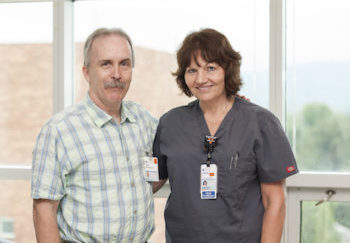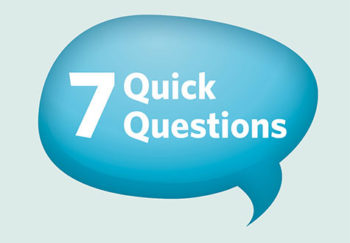
After a tow truck crashed head-on into Pete Weatherly’s car, it took first responders over an hour to remove him from the wreckage. It took two weeks for him to awaken from a coma, five months to recover from the severe fracture in his leg, a torn aorta and other internal injuries, and over a year to learn to walk again.
Weatherly, 61, has overcome most of the physical injuries he sustained in the accident 13 years ago. But the emotional and psychological impact still lingers. “Obviously this was a major change in my life,” he says. “There have been some lows and frustrations along the way.”
A former special education teacher, Weatherly had to change careers because he couldn’t stand for long periods. He had to give up some of the activities he loved, including running, which was a big part of his mental health. And when he went to follow-up hospital appointments – with all of the sights, smells and sounds that were so vivid after his accident – he was overcome by anxiety.
“Just because patients recover from their physical injuries doesn’t mean that they’re better,” says trauma nurse practitioner Elizabeth Alvarez. “It’s common for patients to experience post-traumatic stress disorder [PTSD] after a medical trauma.”
The Emotional Impact of Medical Trauma
In addition to possible chronic pain, patients who experience medical trauma often must accept an entirely new way of life. “One of biggest challenges is the loss of control,” says Weatherly. “You have to rely on everyone else to do things for you and that can be devastating.”
“You go through the stages of grief,” adds Alvarez. “The disbelief, the bargaining and anger. You grieve the life you thought you were going to have. Medical trauma can change the trajectory of a patient’s life. People forget about the mental toll this can take on someone.”
Medical PTSD Symptoms
According to Alvarez, signs of medical trauma may include:
- Isolation
- Depression
- Lack of interest in things they used to enjoy
- Weight loss
- Increase in alcohol or opioid use
- Anger
Finding A Lifeline: Meeting Other Trauma Survivors
For Weatherly, the key to moving beyond his grief was reaching out to others. His first lifeline was UVA Children’s teacher Lisa Black, whom he met at the gym. “I noticed she had the same brace as me, so I just went up to her and said, ‘There has to be a story there,’” he says. It turned out Black’s story was very similar to his own.
“It was the first time I’d ever met someone who had survived a traumatic accident,” says Weatherly. “She had an understanding of what it’s like to live with PTSD, the pain, the recovery and adapting to a new normal. It meant so much to me.”
From that first encounter came many more meetings to share their experiences. Soon another trauma survivor, Patty Grimm, joined them. “We started talking about how important it was for people to talk to other survivors.” Black approached James F. Calland, MD, head of trauma medicine, about starting a peer support group.”
Helping Others Navigate Life After a Traumatic Injury
Today, the Charlottesville chapter of the Trauma Survivors Network support group is in full swing. With around a dozen members so far, the group meets monthly at the hospital. Alvarez is the group coordinator. “We meet for 90 minutes on Saturdays,” she says. “We do a lot of just sharing stories, comparing and contrasting experiences. Survivors want to be heard and speaking out loud helps them process their trauma.”
Are You a Medical Trauma Survivor?
Join the next Trauma Survivors Network support group meeting on December 28.
The group also offers peer-to-peer support. Weatherly is a regular hospital volunteer, visiting with select patients and their families. For him, it’s a win-win experience.
“Volunteering is so rewarding for me because it helps confirm that there was a reason for this to happen to me, that good things can come out of my accident,” he says. “And I think most visits I have with patients are helpful. I provide them information on the resources available to them. By encouraging them to do simple things like making lists and writing down questions for their doctors, I help them understand that they can get some control back, albeit in small ways.”
“I also offer them understanding and empathy. I let them know that the journey they’re starting I’ve been on and there is hope. That doesn’t mean there’s not going to be any pain or any changes, but I let them know they’re in good company. That’s why we started these support meetings.”

I wish there was something like this where I live. My trauma was a shattered upper left leg put together with a rod, plate and screws. It was the infection that I got afterward from the hospital that pretty much devastated me. I had to go into a nursing home for almost two years which if you aren’t prepared mentally for can be traumatic as well. I am blessed that I could come back home but nothing is the same. I can’t do what I did before which is ranching, I was left with almost no stamina, unable to lift and carry 50 pound feed sacks. The infection left my foot on the side where the leg was shattered, mishapened, almost two sizes larger than my right foot – unrecognizable as my foot. The wound care people here were less than helpful due to a second round of infection I was diagnosed with a bone infection in my left leg. I now have anxiety to the point of will actually start shaking and panicking in a doctor’s office. I have had round after round of explosive gastrointestinal issues due to being on IV Pic line high powered antibiotics and the response of the wound care doctor is “oh well that is something you will have to deal with” I am not understanding how you take someone who is a fighter and turn them into a mess of shaking terrorfied exhausted mess and have the attitude not of a healer.
Never give up.
I am praying the He puts people in your life who will help in your healing.
My daughter was a P.A. at UVA: excellent care.
Keep us posted.
Robin,
I am so sorry for your accident and the traumatic experiences that followed it. I cannot begin to imagine what you have been through. I would like to invite you to our monthly Trauma Survivor Network Trauma Talk Group here at UVa. Though it is not counseling or therapy it is a safe space where other survivors come to share their stories and meet other people who are or have walked down a similar path. We meet once a month at 1pm-2:30, our next meeting is Jan. 14th, 2020. Looking forward to seeing you there.
I was one of the nurses who took care of Pete all those years ago, and I remember him well! I am glad to know he is doing well and that he continues to “pay it forward” as a volunteer. His strength and perseverance are inspiring and I’ll never forget him